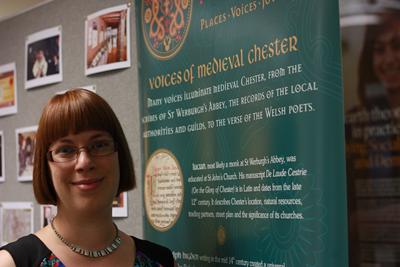Medieval Swansea project shortlisted for national public engagement award

A project which has brought to life the medieval history of Swansea has been shortlisted for a national award which highlights the benefits of the public engagement of research.
The project, led by University of Southampton Professor of English Catherine Clarke, is one of three shortlisted for the Arts, Humanities and Social Sciences award in the national Engage Competition run by the National Co-ordinating Centre for Public Engagement (NCCPE). The awards recognise the innovative and effective ways the general public are engaging with UK research – from inspiring young people with new advances in knowledge to encouraging the public to actively contribute to research.
The ‘City Witness’ project led by Professor Clarke, a specialist in medieval literature and culture, has worked with partners in Swansea to research the city’s medieval heritage and make it accessible to local communities and visitors. Through their research into medieval Swansea, Professor Clarke and her team engaged and collaborated with experts at the Glamorgan Gwent Archaeological Trust and heritage interpretation professionals at Swansea Museum.
As a result, the project team produced an exhibition at Swansea Museum and a website, which presented their research materials as well as an interactive, GPS-enabled tour map linked to pavement markers, and a game. The team’s activities also contributed to the regeneration of Swansea city centre and the Council’s development of a new ‘Castle Quarter’.
“We are delighted to be shortlisted for this year’s Engage awards,” said Professor Clarke. “Our project was inspired by the challenge of the lost landscape of medieval Swansea as much of the material heritage of the city’s medieval history is almost invisible today.
“Wartime bombing and later re-development of the city centre have almost completely obscured its rich historic legacy but we wanted to discover how we could make an invisible city visible again and explore what resources we could develop to allow local people and visitors to step into the medieval town,” Professor Clarke explained. “We were also inspired by the amazing manuscript source in the Vatican Library, which offers a vivid account of Swansea in the Middle Ages, in ordinary people’s own words.
“One of the most exciting and engaging things about the manuscript in the Vatican is that it tells the story of an outlaw who was hanged in Swansea in 1290 - but came back to life!” Professor Clarke enthused. “It's the accounts of medieval eyewitnesses which are given in the manuscript, and which allowed us to explore how they experienced and represented their city.
“Our team had previously completed a project on medieval Chester, which engaged wider publics with new research on the city’s medieval past,” she concluded. “But we had to adapt our approach radically for Swansea, where, by contrast, so little built heritage survives and there isn’t any established medieval heritage tourism.”
The winners of this year’s Engage Competition will be announced at an event on the 29th November 2016 as part of the NCCPE Engage Conference in Bristol. This year’s competition attracted over 180 entries which demonstrate a broad range of high quality activities to inspire and involve public audiences in six categories. The winner of each category will receive a prize of £1,500 to go towards further public engagement work.